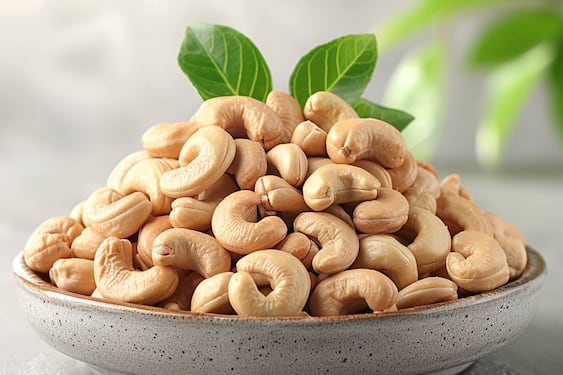Cashew Caution: The Hidden Risks For Those With Kidney Disease
Cashews can trigger allergies, digestive discomfort, and kidney stone formation due to their oxalate content. High sodium in salted cashews raises blood pressure, and their phosphorus content can harm those with kidney disease. Cashews can also interact with medications, lower blood sugar, and worsen skin conditions like acne. Improper storage may lead to mold and aflatoxin contamination.

Cashews, while nutritious, may not be suitable for everyone. They should be avoided by those with allergies, kidney stones, or digestive issues due to their high oxalate and fat content. Processed cashews high in sodium can raise blood pressure, and their phosphorus levels can harm individuals with kidney disease. Cashews may interact with certain medications, lower blood sugar excessively, and contribute to skin issues like acne. Additionally, improper storage can lead to aflatoxin contamination, posing cancer risks.
1. Allergy Risk
Some individuals are allergic to tree nuts like cashews. Cashew allergies can cause severe reactions, including hives, swelling, difficulty breathing, and in some cases, anaphylaxis. If you have any known nut allergies or have experienced reactions to cashews in the past, avoid them altogether.
2. High Oxalate Content (Kidney Stones)
Cashews are high in oxalates, which can contribute to kidney stone formation. If you have a history of kidney stones or are prone to developing them, especially calcium oxalate stones, it's advised to limit or avoid cashews. Consuming excessive oxalates can increase the risk of stone formation over time.
3. Weight Management (High-Calorie Content)
Cashews are calorie-dense, with about 155 calories in a 1-ounce (28g) serving. Overconsumption can lead to unwanted weight gain, especially if not accounted for in a balanced diet. If you're trying to manage your weight, it's better to consume cashews in moderation or choose lower-calorie snack alternatives.
4. Gastrointestinal Issues
Cashews are high in fat, which can be hard to digest for some individuals. Consuming too many cashews might lead to bloating, indigestion, or stomach cramps. If you suffer from digestive issues such as irritable bowel syndrome (IBS), cashews might aggravate your symptoms due to their fiber and fat content.
5. Sodium Content in Processed Cashews
Many commercially available cashews are roasted and salted. High sodium intake can lead to hypertension and other cardiovascular issues. If you are on a low-sodium diet or have high blood pressure, opt for unsalted cashews or limit consumption of salted varieties.
6. High Phosphorus Content (Kidney Disease)
Cashews contain a significant amount of phosphorus, which may pose a risk to individuals with chronic kidney disease (CKD). For those with impaired kidney function, phosphorus levels can accumulate in the blood, leading to weakened bones and calcification of blood vessels and tissues. It's recommended to avoid or limit cashews if you have CKD.
7. Hypoglycemia (Low Blood Sugar)
Cashews can lower blood sugar levels, which may be harmful to individuals prone to hypoglycemia or those taking medications for diabetes. If you're managing diabetes with medication, eating too many cashews could potentially lead to excessively low blood sugar levels. Always monitor your intake and consult your doctor if needed.
8. Presence of Aflatoxins
Cashews, like other tree nuts, may be contaminated with aflatoxins, a type of mold that can be carcinogenic if consumed in large quantities over time. Improperly stored cashews can develop mold, leading to aflatoxin contamination. Always buy from reputable sources and store cashews in a cool, dry place.
9. Interaction with Medications
Cashews contain significant amounts of magnesium, which can interfere with certain medications like antibiotics, blood pressure drugs, and diuretics. Excessive intake of cashews can reduce the effectiveness of these medications. If you are taking any of these drugs, it's best to consult your healthcare provider before consuming large amounts of cashews.
10. Increased Risk of Acne and Skin Issues
Cashews are rich in fats and oils, which may aggravate acne or oily skin in some individuals. If you're prone to breakouts or other skin issues, consuming large amounts of cashews might worsen your condition due to their oil content. Those with sensitive skin should consider moderating their intake.
Conclusion
While cashews are nutrient-dense and provide numerous health benefits, there are specific conditions where their consumption should be avoided or moderated. Allergies, digestive issues, kidney problems, high blood pressure, and medication interactions are some of the reasons to be cautious with cashews. Always assess your health condition and consult with a healthcare professional when in doubt.
